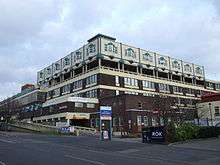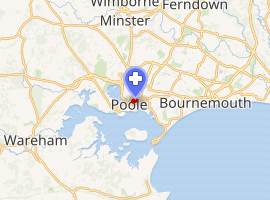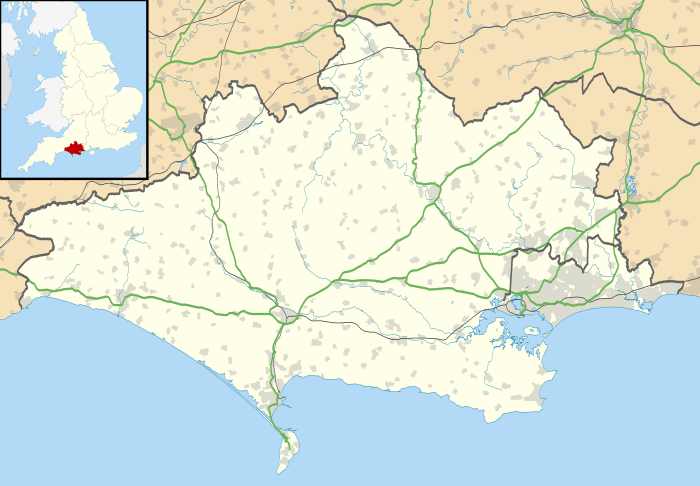Poole Hospital
Poole Hospital (also known as Poole General Hospital) is an acute general hospital in Poole, Dorset, England. Built in 1907, it has expanded from a basic 14-bed facility into a 789-bed NHS foundation trust hospital. It is the trauma centre for east Dorset and provides specialist services such as cancer treatment for the entire county.
| Poole Hospital | |
|---|---|
| Poole Hospital NHS Foundation Trust | |
 | |

| |
 Shown in Dorset | |
| Geography | |
| Location | Poole, Dorset, United Kingdom |
| Coordinates | 50°43′17.4″N 1°58′24.6″W |
| Organisation | |
| Care system | Public NHS |
| Type | General |
| Services | |
| Emergency department | Yes Accident & Emergency |
| Beds | 789 |
| History | |
| Opened | 1907 |
| Links | |
| Website | http://www.poole.nhs.uk/ |
| Lists | Hospitals in the United Kingdom |
Location
Poole Hospital is situated on Longfleet Road (part of the B3068 road), just below St Mary's Church, in the Longfleet area of Poole approximately 0.5 miles (0.80 km) from the town centre. The hospital's maternity unit lies opposite the main building in St. Mary's Road. The hospital has an adjacent multi-story car park and a total of 307 parking spaces. It is served by several bus routes operated by More Bus and Yellow Buses.[1][2]
History
In 1897, Poole's hospital was established inside a mansion house in the town centre. Known as Poole Mansion, the house had been built in 1749 by John Bastard for a prosperous local merchant but had since been bought by local wealthy landowner Ivor Guest, 1st Baron Wimborne.[3] The hospital was named Cornelia Hospital after its benefactress, Lady Cornelia Spencer-Churchill, daughter of the 7th Duke of Marlborough and wife of Ivor Guest. In 1907, the hospital relocated to Longfleet Road to offer patients the "purer air of Longfleet" and to provide space for future expansion.[3] The new hospital cost £3,369 to construct and contained 14 beds.[4]
During the First World War, two additional wards were built with 65 beds for the treatment of wounded servicemen. The hospital was damaged by German air-raids during the Second World War and several of the hospital buildings were rebuilt. In 1947, the Cornelia was renamed "Poole General Hospital" and following the establishment of the National Health Service (NHS) in 1948, it became an NHS hospital. During the 1950s, a new pathology department and an outpatients unit were created and in 1961; a maternity unit was built to the north of the main hospital building.[5]
By 1960, the main hospital buildings required modernisation and work began on a new hospital. Most of the hospital was demolished and replaced with a 500-bed facility with 1,150 staff which cost £5,000,000 to build and equip.[6] The new hospital was formally opened in a ceremony attended by Queen Elizabeth II in July 1969.[7] Further expansion has seen bed numbers increase to 789 and staff numbers increase to some 4,300 employees.[8] In November 2007, Poole Hospital became an NHS foundation trust which was said to give it greater financial and operational freedom.[9]
Services
Poole Hospital provides a range of district hospital care for the 270,000 residents of Poole, Purbeck and east Dorset, and is the major trauma centre for east Dorset.[8] In 2009 the hospital treated 46,815 inpatients, 172,710 outpatients, 17,597-day-cases and 56,557 people attended the Accident & Emergency department.[10] It also provides child health and maternity services for a catchment area which includes Bournemouth and Christchurch, and some specialist services such as neurological care and oral surgery for the entire county.[8] Specialist palliative care is provided in a purpose built unit named Forest Holme which contains 10 beds for inpatients on the first floor and facilities for outpatients, teaching and counselling support on the ground floor.[11]
The hospital houses the Dorset Cancer Centre which is the specialist cancer treatment centre, including comprehensive Radiotherapy services, for adults in Dorset. Child cancer treatment at Poole Hospital is carried out in partnership with the Paediatric Oncology Centre in Southampton General Hospital.[12]
Poole Hospital's maternity unit, known as St Mary's Maternity Hospital, is the centre for high risk maternity care in east Dorset. Equipped with a 10-bed antenatal ward, it provides midwifery and obstetric care, and undertakes approximately 3,800 deliveries per year.[13]
Performance

Poole Hospital is authorised and regulated by Monitor, the independent regulator of NHS foundation trusts. For the period 1 April 2008 to 31 March 2009, the Care Quality Commission's annual assessment gave Poole Hospital an "excellent" rating for quality of services which includes: safety of patients, waiting times and cleanliness.[14] Based on an annual financial risk rating awarded by Monitor, the Care Quality Commission also rated the hospital's quality of financial management as "excellent".[15]
The hospital reported a turnover of £183 million with a surplus of £3.4 million for 2008/09.[16] However, Monitor's quarterly review for 1 January to 31 March 2010 reported that the hospital's financial risk rating had deteriorated from a rating of three to two (five reflects the lowest level of risk and one the highest).[17] In April 2010, it was reported the hospital forecast a budget deficit of £3 million for the year and required £7 million of savings to break even by the end of the following financial year.[16]
Poole General Hospital was named the safest hospital in the UK by the CHKS Patient Safety Awards in 2009. The award was given following an analysis of all UK hospitals which measured hygiene and cleanliness levels and rates of hospital-acquired infections such as MRSA.[18]
Merger
A proposed merger between the Trust and Royal Bournemouth & Christchurch Hospitals NHS Foundation Trust, the first merger proposed between two NHS Foundation Trusts was blocked in October 2013 by the Competition Commission in its first intervention into the NHS.[19] In September a judicial review brought against Dorset Clinical Commissioning Group which challenged renewed merger proposals was rejected by the High Court. It is proposed that the emergency department at Poole will be downgraded to an urgent care centre and the hospital will become an elective centre. Emergency work will be concentrated at the Bournemouth site.[20]
In April 2020 the Competition and Markets Authority approved the merger proposal. They said: “The CMA’s investigation in this case has confirmed that competition between NHS hospitals now plays little role in the provision of NHS services in the east Dorset area, with collaboration often viewed as a better way to meet increasing demands for care and deliver better value.” It is not yet clear when the merger will happen. [21]
References
| Wikimedia Commons has media related to Poole Hospital. |
- "How to find Poole Hospital" (PDF). InHealth. 2009. Retrieved 18 July 2010.
- "Maps, Directions and Contact details". NHS. 2010. Retrieved 18 July 2010.
- Beamish, Derek; Hillier, John; Johnstone, HFV (1976). Mansions and Merchants of Poole. Poole Historical Trust. pp. 80–81. ISBN 0-7137-0836-0.
- "Poole Hospital Centenary" (PDF). Poole Hospital NHS Foundation Trust. Archived from the original (PDF) on 31 October 2008. Retrieved 18 July 2010.
- "NHS60 Celebrations". Poole Hospital NHS Foundation Trust. 2008. Archived from the original on 27 July 2011. Retrieved 18 July 2010.
- "Annual Report 1 April to 31 October 2007" (PDF). Poole Hospital NHS Foundation Trust. 30 April 2008. Archived from the original (PDF) on 27 July 2011. Retrieved 18 July 2010.
- Legg, Rodney (2005). The Book of Poole. Halsgrove. p. 146. ISBN 1-84114-411-8.
- "Poole Hospital NHS Foundation Trust: Overview". NHS. 2010. Retrieved 18 July 2010.
- "Poole and East London join NHS foundation trust sector". Monitor. 2008. Retrieved 18 July 2010.
- "What We Do and Who We Serve". Poole Hospital NHS Foundation Trust. 2010. Archived from the original on 3 July 2010. Retrieved 18 July 2010.
- "Forest Holme Hospice". Poole Hospital NHS Foundation Trust. Retrieved 5 September 2018.
- "Dorset Cancer Centre". Poole Hospital NHS Foundation Trust. 2010. Archived from the original on 23 December 2010. Retrieved 18 July 2010.
- "Maternity". Poole Hospital NHS Foundation Trust. 2010. Archived from the original on 11 May 2007. Retrieved 18 July 2010.
- "Poole Hospital NHS Foundation Trust 2008/2009: Quality of services". Care Quality Commission. 2009. Archived from the original on 1 July 2012. Retrieved 20 July 2010.
- "Poole Hospital NHS Foundation Trust 2008/2009: Quality of financial management". Care Quality Commission. 2009. Archived from the original on 13 November 2009. Retrieved 20 July 2010.
- "Poole Hospital must save £3m to break even". Daily Echo. 3 April 2010. Retrieved 20 July 2010.
- "NHS foundation trusts: Review of twelve months to 31 March 2010". Monitor. 28 June 2010. Retrieved 20 July 2010.
- "Poole Hospital is the safest in the UK". Poole Hospital NHS Foundation Trust. 8 May 2009. Archived from the original on 27 July 2011. Retrieved 20 July 2010.
- "Hospital merger blocked by Competition Commission". Bournemouth Echo. 17 October 2013. Retrieved 1 November 2013.
- "Acute reconfiguration to go ahead after CCG wins judicial review". Health Service Journal. 6 September 2018. Retrieved 8 October 2018.
- "Regulator approves long-running merger plans". Health Service Journal. 27 April 2020. Retrieved 8 June 2020.